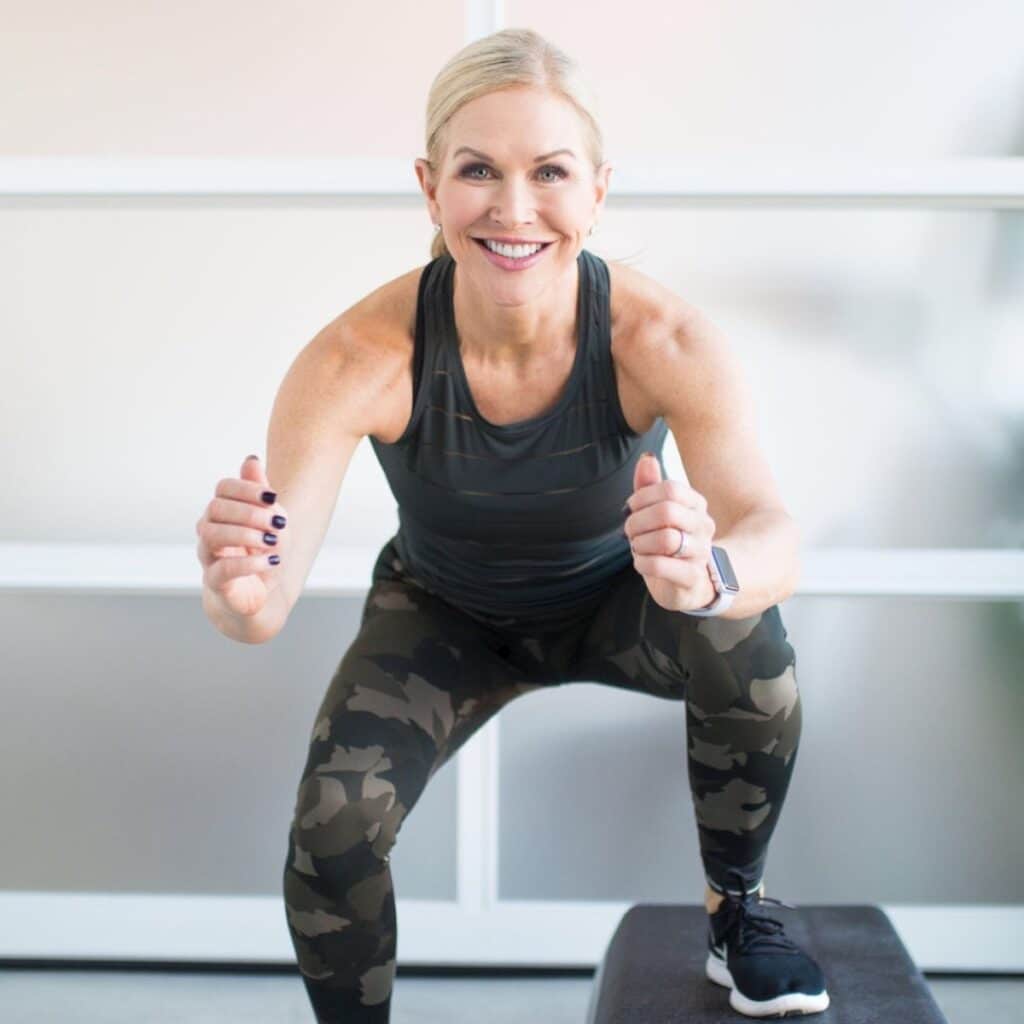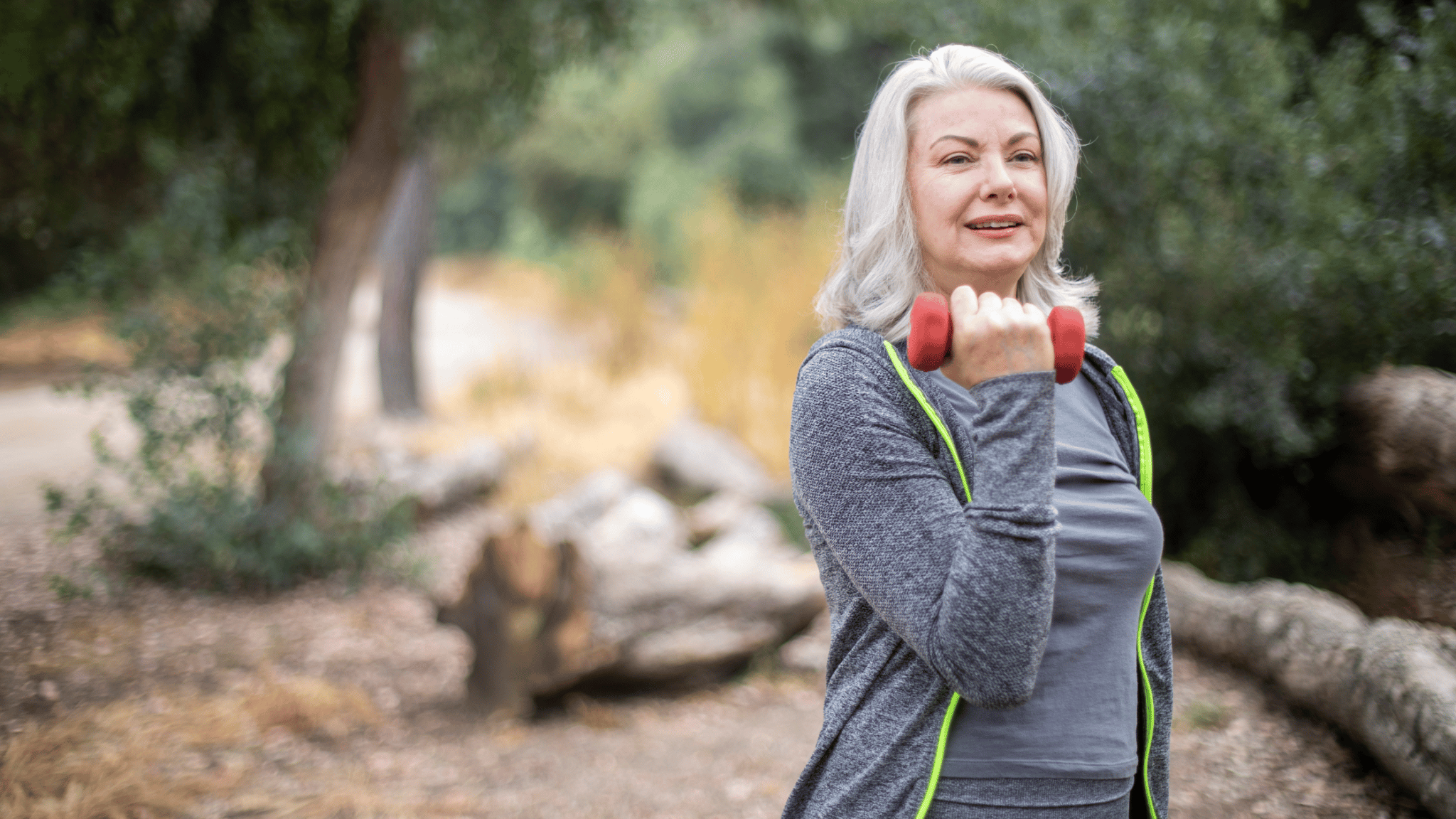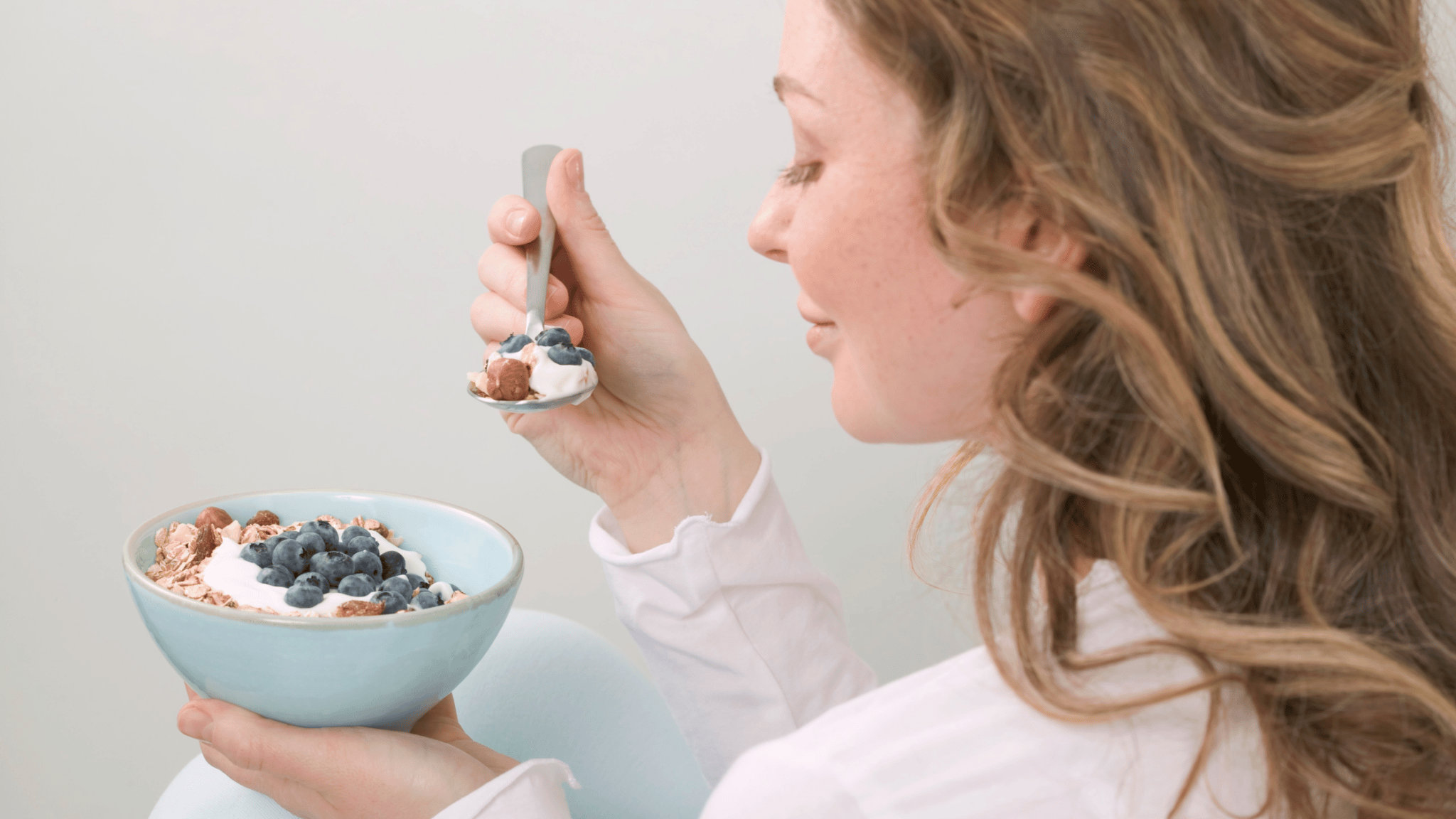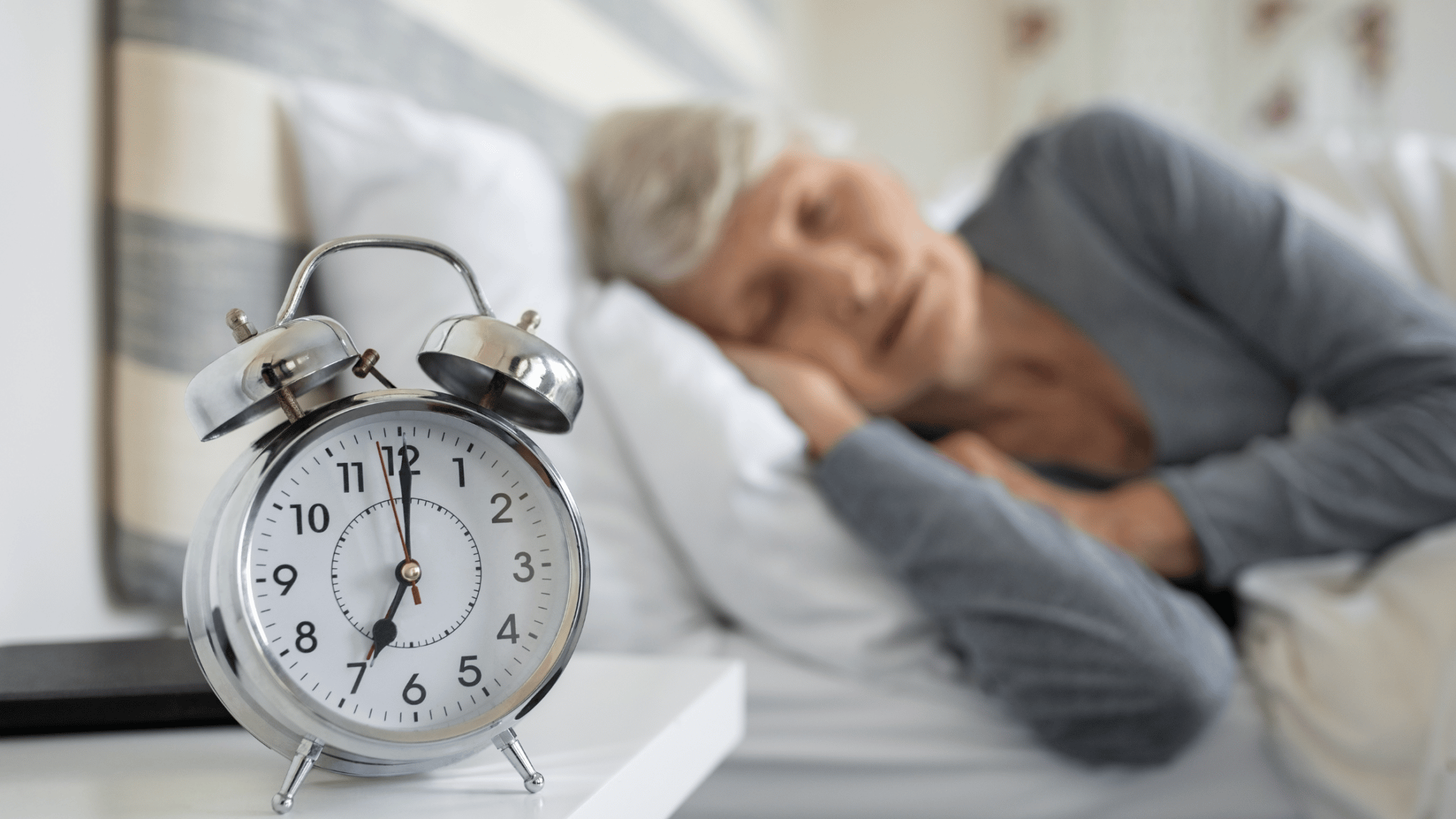This post contains affiliate links. Please see our disclosure policy.
You aren’t alone if you want to lose weight after 50. It’s extremely common to notice extra weight gain along with other menopause symptoms. But luckily, there are a few things you can do about it!
Six lifestyle factors can exacerbate menopausal weight gain after 50; Let’s explore why many women gain weight after 50 and the concrete things you can do to prevent menopausal weight gain in the first place.

Save This Article To Read Later
Table of Contents
What Causes Weight Gain After 50
Lifestyle and hormonal fluctuations are likely the causes of weight gain during a woman’s menopausal years.
During menopause, significant hormonal changes can affect how your body is shaped, namely decreasing estrogen. Lower estrogen levels can cause a woman’s fat to distribute more in her midsection.
A pear-shaped woman can find themselves becoming more “apple-shaped” in middle age. But this change in body shape doesn’t necessarily translate to a higher number on the scale—which is what many women in their 50s also notice.
According to the North American Menopause Society, the average woman gains five pounds during menopause, but some women put on much more.
These same researchers, however, will also tell you that there is no scientific evidence that menopause causes weight gain. So our shapes may change…but the number on the scale doesn’t necessarily need to. This is beyond frustrating for anyone dealing with weight gain.
What gives? And what can we do about it?

How to Lose Weight After 50
1. Balance Your Hormones

Step one in losing weight after 50 is bringing your hormones into balance as best you can. I recommend seeing a trusted physician, nutritionist, or chiropractor to help get your hormone levels dialed in.
It’s fascinating to know that with some simple vitamin additions and lifestyle changes, you can set your body up to absorb nutrition, regulate your modes, assist your thyroid, and so much more.
These professionals can help you balance your estrogen, insulin, cortisol, and leptin levels.
2. Strength Train

Muscle is the active tissue in your body that burns up more calories than body fat. The more muscle you have on your body, the more calories your body burns at rest.
As we age, we slowly lose a little bit of that muscle each year if we are not actively replacing it. In fact, as early as age 30, we start to lose 5% of our muscle mass with each passing decade.
So by the time menopause rolls around, less muscle and less activity can unknowingly slow down your metabolism and your body’s ability to burn calories.
You can replace lost muscle with strength training. You can lift weights or use your own body weight to build muscle all over and, in turn, boost your metabolism.
How to Get Started Strength Training at 50
Strength training burns a lot of calories, strengthens your joints and connective tissue, and builds bone density along the way.
These are all extremely important as you work through menopause and beyond.
- Get started with these 11 moves that are designed for women over 50.
- You can also try this low-impact HIIT workout that combines strength and cardio and is easy on the knees. This workout is a favorite for anyone looking to accomplish a lot in a short time.
3. Eat Quality Food and Cut Back On Sugar

Dessert may or may not be the problem for you. The real issue, however, is that unwanted, extra sugar is found in EVERYTHING, from barbecue sauce to breakfast sausage to bread!
Unfortunately, not only does excess sugar cause you to pack on the pounds, but sugar makes other menopausal symptoms, like hot flashes, worse.
So if you want to lose weight after 50, you will need to reconcile with breaking the sugar cycle and eating more whole, nutritious foods.
Tips For Food Choices When You Want To Lose Weight After 50
- Make sure your diet is filled with dark, leafy greens, brightly-colored vegetables, fruits, lean meat, and fish.
- Go organic to avoid preservatives, pesticides, and chemicals that disrupt your hormones.
- Choose foods that reduce inflammation in the body and avoid those white, starchy, or sugary carbs that spike blood sugar and end up getting stored as fat.
- Eating things that come “as-is” is your best bet! Think of a piece of chicken, an egg, a handful of almonds, and a sweet potato.
- Choose natural sugar found in fruit. It is better for you because it’s accompanied by fiber; this helps your body break down the sugar more easily than artificial sugars.
4. Prioritize Mindful Self-Care

Let’s face it, there can be many new and difficult challenges that come with this period in life. Children leaving or marrying, caring for aging parents, a spousal death or illness, job changes, or nearing retirement—all these things can add up and cause new and unwanted stress.
Stress increases your cortisol level, which can lead to excess belly fat.
And no- we can’t change the stress in our lives. However, knowing and expecting change and learning how to deal with stress make all the difference in the world.
That’s why if you want to lose weight after 50, it’s time to put yourself first.
Likely you’ve spent many years caring for others—and that’s a beautiful thing—but you shouldn’t feel guilty about putting your self-care at the top of your to-do list.
How To Start Prioritizing Your Mental Health at 50
- Schedule daily time to meditate
- Improve your mindset by finding your positive affirmation
- Start a gratitude practice to increase your happiness
- Spend time with a friend
- Reconnect with a creative passion
- Read a book
- Make it a priority to check in with yourself daily calmly and carefully
5. Consistent Activity

Want to hear some truth? You probably move less than you used to.
Take a real assessment of your daily activities and see what you come up with. And it’s not just exercise but also your daily activity – actual steps and time not spent on the couch.
The CDC recommends a minimum of 150 minutes of exercise a week. But in addition, if you want to lose weight after 50, make sure you stay active throughout the entire day. It’s not enough to simply get in a 30-minute workout in the morning and then spend the rest of the day on the couch.
Consistent cardiovascular activity, as well as daily movement, is equally as important as strength training.
According to the Mayo Clinic. “Sitting is the new smoking” Daily movement is key! In addition, cardio strengthens your heart, increases your energy, and helps you lose weight after 50.
What if moving all day hurts more than they used to
It doesn’t have to be high impact to work. There are plenty of low-impact options, such as:
- Low Impact Cardio Workout you can do at home
- 12-Minute Low-Impact HIIT Workout (No Jumping)
- 5 Exercise Modifications For Bad Knees and A Low-Impact Workout Plan
- A Low-Impact, High-Results Workout To Do At Home
- The Best Low-Intensity Workouts
- 30-Minute Pool Workout
- And don’t forget about all the benefits of a good walking program
Doing exercise things like gardening, walking the dog, going for a bike ride, taking the stair, parking far away, and daily chores count too!
A day spent moving your body will add up!
6. Create Healthy Sleep Habits

Sleep can become challenging as we age, and poor sleep tends to create a domino effect on your hormones, eating, and exercise habits.
When you don’t get enough sleep, two key hormones in your body—leptin and ghrelin—get thrown out of whack.
These hormones are responsible for your appetite, so after a night of poor sleep, you’re chemically motivated to eat more to feel satiated—and the foods you crave are usually of the salty or fatty variety.
Getting a good night’s sleep can often be the first step in addressing poor eating habits and a lack of energy that affects your desire to exercise.
Steps To A Healthy Sleep Schedule
- First, make your bed for sleeping! It can be so easy to answer emails or texts in bed when you first wake up, or insist upon staying in bed even when you’re tossing and turning. But most sleep experts agree that you should only use the bed for sleep.
- If you are unable to sleep after 15 minutes, you should get up and walk around, do a calming activity like reading a book, or occupy yourself in another way until you get sleepy again.
- Second, create a good sleeping environment. Keep your bedroom dark with blackout shades, and get your partner on board with setting the thermostat low. According to most sources, between 60-68 degrees is preferred, with 65 degrees being most optimal.
- Third, and probably most important, don’t eat sugary, fatty foods or drink alcohol or caffeine too close to bedtime. These are sleep stealers! The fat will build up acid in your stomach and cause heartburn, and the sugar will either keep you awake or wake you up a few hours into your sleep. Alcohol metabolizes quickly and has the same effect as sugar, only worse.
- If you are hungry before bed, try sleep helpers like a tablespoon of almond butter on whole wheat toast or fruit, 1/2 cup of jasmine rice, 1/2 cup nuts and dried fruit or a 1/2 cup greek yogurt.
- You should avoid caffeine. Just because it didn’t keep you awake in your 30’s doesn’t mean it won’t keep you awake now! You’ve changed.
- BONUS: Anecdotal evidence has shown that a few minutes of calm, slow yoga can also promote good sleep. Try this Bedtime Yoga for Better Sleep and see what you think!
Getting older holds many positive and exciting new changes. However, it also holds its own challenges. Don’t let weight gain be one of them. Keep a positive attitude and do what you can to stay healthy and strong.
Remember—it’s your body, and you have the power to feel great in it!



Good read. Thanks for sharing.
Useful Article!
Love this. Thank you for sharing this, such helpful reminders.
This is so helpful. Thank you so much for sharing.
Well – we all need to help each other as we age. I’m turning 58 this year and boy has my body changed in the last 8 years. BUT – there are so many things we can do to take care of ourselves. Thanks for reading!